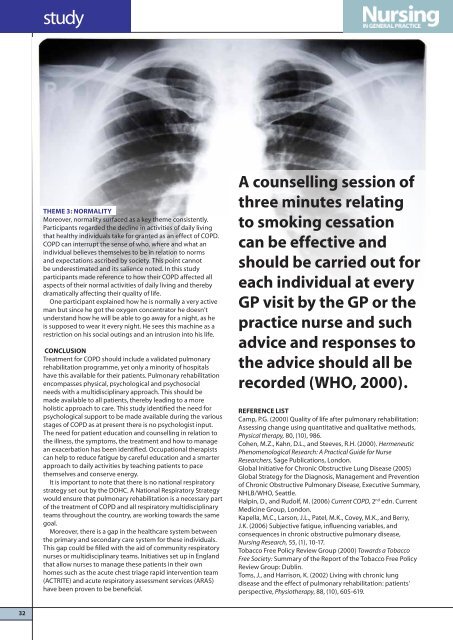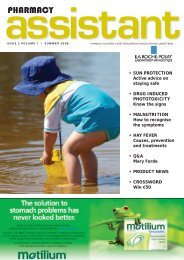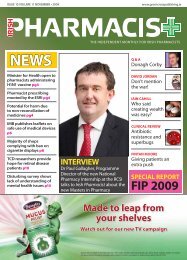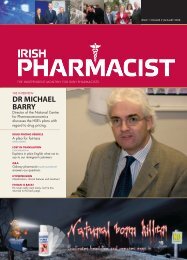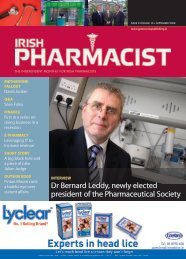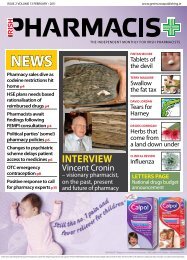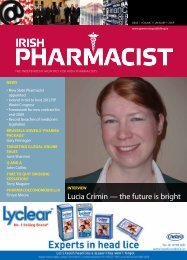veNTIlATIoN - Green Cross Publishing
veNTIlATIoN - Green Cross Publishing
veNTIlATIoN - Green Cross Publishing
Create successful ePaper yourself
Turn your PDF publications into a flip-book with our unique Google optimized e-Paper software.
32<br />
study<br />
Theme 3: NormAlITy<br />
Moreover, normality surfaced as a key theme consistently.<br />
Participants regarded the decline in activities of daily living<br />
that healthy individuals take for granted as an effect of COPD.<br />
COPD can interrupt the sense of who, where and what an<br />
individual believes themselves to be in relation to norms<br />
and expectations ascribed by society. This point cannot<br />
be underestimated and its salience noted. In this study<br />
participants made reference to how their COPD affected all<br />
aspects of their normal activities of daily living and thereby<br />
dramatically affecting their quality of life.<br />
One participant explained how he is normally a very active<br />
man but since he got the oxygen concentrator he doesn’t<br />
understand how he will be able to go away for a night, as he<br />
is supposed to wear it every night. He sees this machine as a<br />
restriction on his social outings and an intrusion into his life.<br />
coNclusIoN<br />
Treatment for COPD should include a validated pulmonary<br />
rehabilitation programme, yet only a minority of hospitals<br />
have this available for their patients. Pulmonary rehabilitation<br />
encompasses physical, psychological and psychosocial<br />
needs with a multidisciplinary approach. This should be<br />
made available to all patients, thereby leading to a more<br />
holistic approach to care. This study identified the need for<br />
psychological support to be made available during the various<br />
stages of COPD as at present there is no psychologist input.<br />
The need for patient education and counselling in relation to<br />
the illness, the symptoms, the treatment and how to manage<br />
an exacerbation has been identified. Occupational therapists<br />
can help to reduce fatigue by careful education and a smarter<br />
approach to daily activities by teaching patients to pace<br />
themselves and conserve energy.<br />
It is important to note that there is no national respiratory<br />
strategy set out by the DOHC. A National Respiratory Strategy<br />
would ensure that pulmonary rehabilitation is a necessary part<br />
of the treatment of COPD and all respiratory multidisciplinary<br />
teams throughout the country, are working towards the same<br />
goal.<br />
Moreover, there is a gap in the healthcare system between<br />
the primary and secondary care system for these individuals.<br />
This gap could be filled with the aid of community respiratory<br />
nurses or multidisciplinary teams. Initiatives set up in England<br />
that allow nurses to manage these patients in their own<br />
homes such as the acute chest triage rapid intervention team<br />
(ACTRITE) and acute respiratory assessment services (ARAS)<br />
have been proven to be beneficial.<br />
A counselling session of<br />
three minutes relating<br />
to smoking cessation<br />
can be effective and<br />
should be carried out for<br />
each individual at every<br />
gP visit by the gP or the<br />
practice nurse and such<br />
advice and responses to<br />
the advice should all be<br />
recorded (who, 2000).<br />
reFereNce lIsT<br />
Camp, P.G. (2000) Quality of life after pulmonary rehabilitation:<br />
Assessing change using quantitative and qualitative methods,<br />
Physical therapy, 80, (10), 986.<br />
Cohen, M.Z., Kahn, D.L., and Steeves, R.H. (2000). Hermeneutic<br />
Phenomenological Research: A Practical Guide for Nurse<br />
Researchers, Sage Publications, London.<br />
Global Initiative for Chronic Obstructive Lung Disease (2005)<br />
Global Strategy for the Diagnosis, Management and Prevention<br />
of Chronic Obstructive Pulmonary Disease, Executive Summary,<br />
NHLB/WHO, Seattle.<br />
Halpin, D., and Rudolf, M. (2006) Current COPD, 2 nd edn. Current<br />
Medicine Group, London.<br />
Kapella, M.C., Larson, J.L., Patel, M.K., Covey, M.K., and Berry,<br />
J.K. (2006) Subjective fatigue, influencing variables, and<br />
consequences in chronic obstructive pulmonary disease,<br />
Nursing Research, 55, (1), 10-17.<br />
Tobacco Free Policy Review Group (2000) Towards a Tobacco<br />
Free Society: Summary of the Report of the Tobacco Free Policy<br />
Review Group: Dublin.<br />
Toms, J., and Harrison, K. (2002) Living with chronic lung<br />
disease and the effect of pulmonary rehabilitation: patients’<br />
perspective, Physiotherapy, 88, (10), 605-619.


